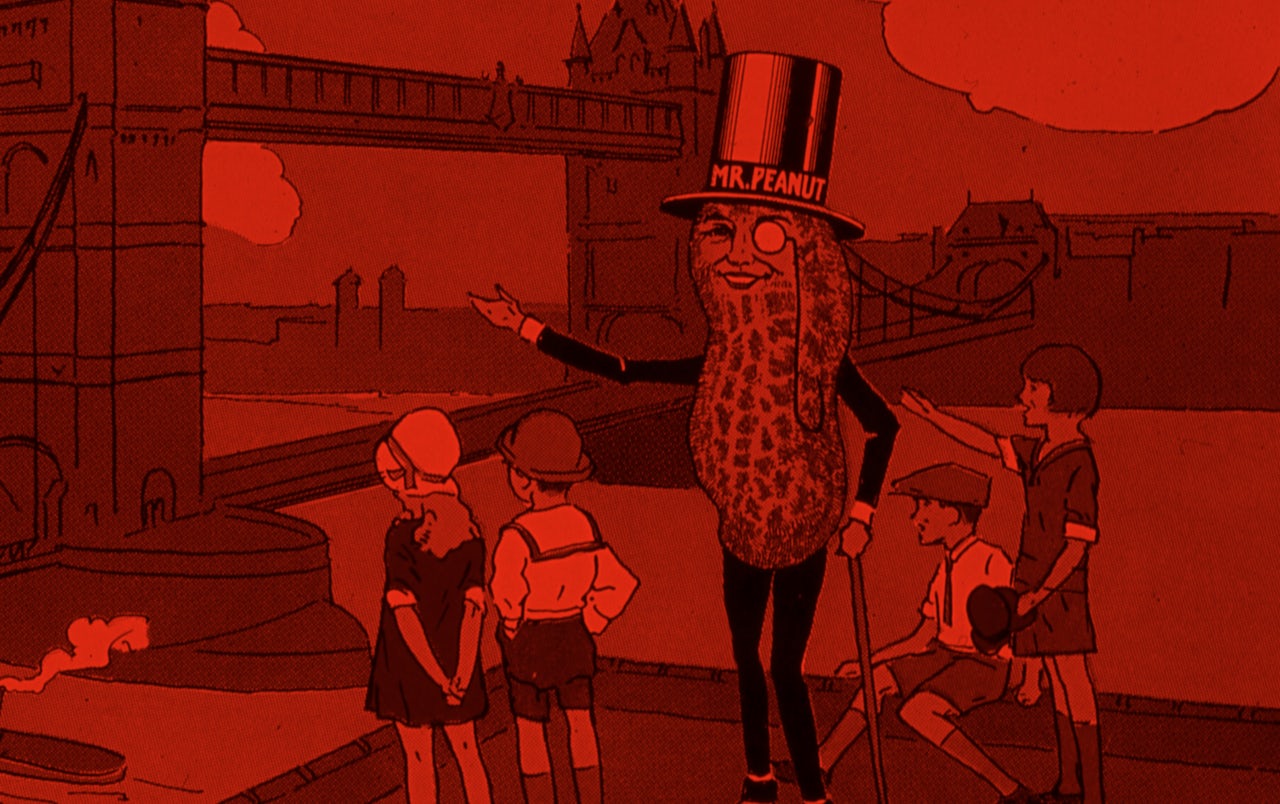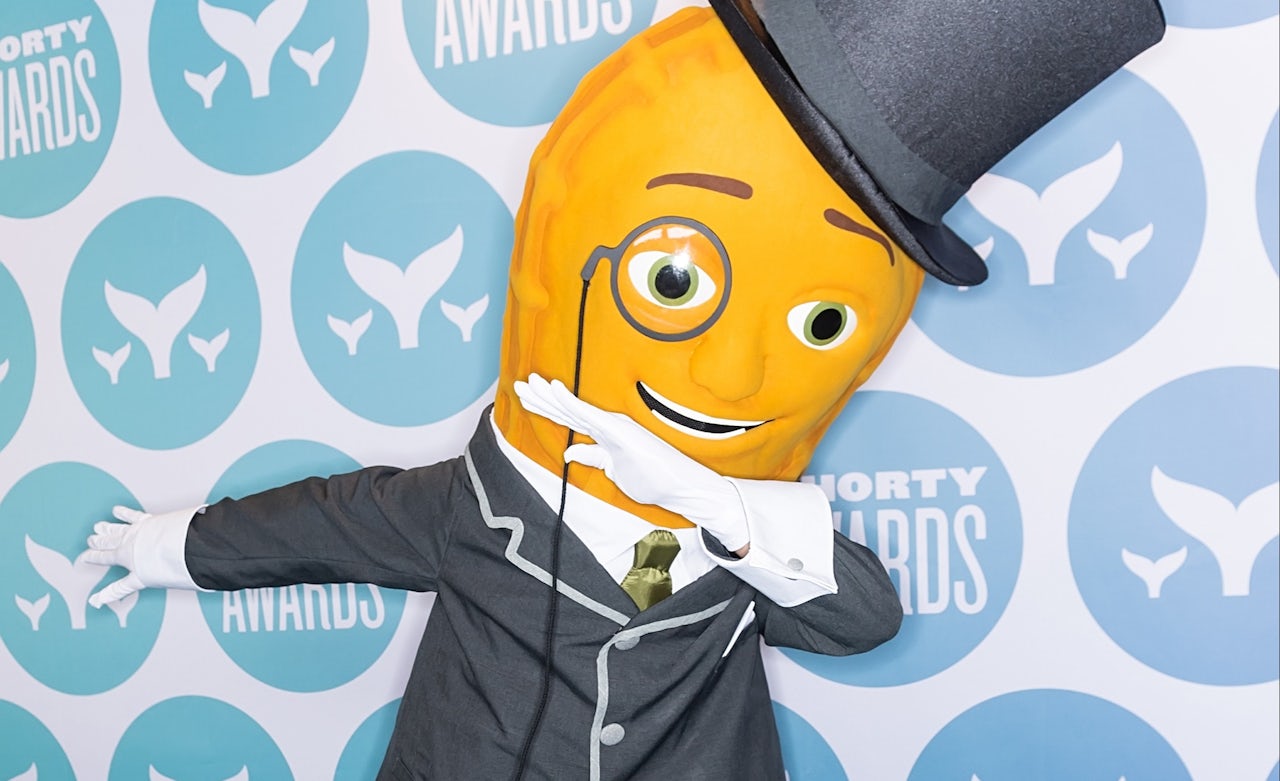Reports of Mr. Peanut’s death have been greatly exaggerated. It’s difficult to tell the current life/death status of Mr. Peanut, born 1916 when a teen submitted him to a design contest, in part because he never truly existed to begin with. But as everyone with a Twitter account has probably heard, Planters last week killed off their mascot in a fiery mountainside car accident, in which the anthropomorphic legume sacrificed himself to save Wesley Snipes and Matt Walsh, who is allegedly a prominent comedian. Though Planters considered Mr. Peanut’s death “a major moment for the brand” for reasons that were never quite explained, the company has suspended the greater ad campaign due to the proximity of Mr. Peanut’s fake death to Kobe Bryant’s real one (a funeral for Mr. Peanut is still scheduled to air during the Super Bowl on Sunday).
Despite the unfortunate timing of the two extremely different and otherwise incomporable deaths, it’s highly probable that Planters was ever-so-cynically looking to take advantage of what has come to be known as Grief Twitter. Grief Twitter is what happens after a famous person dies and thousands take to the site to air their sadness publicly (and oftentimes performatively). It’s not difficult to envision an advertising executive observing this overwhelming process and think, If only there were a way to capitalize on this and sell some peanuts.
Let’s agree on the obvious: There is no way that the Mr. Peanut death campaign was not going to be a total fucking shitshow, and the coincidence of Bryant’s horrific death on Sunday, while inconvenient for the brand, does not excuse how stupid of an idea it was, and how depressing it is to watch brands attempt to do social media.
Don’t take it from me. Mike Pierantozzi, the group creative director at VaynerMedia, the advertising agency that came up with the campaign, gave an interview three days before Kobe’s death pontificating on the brilliance killing off Mr. Peanut. I apologize in advance for how painful this is to read:
We started talking about how the internet treats when someone dies — specifically, we were thinking about fictional characters… When Iron Man died, we saw an incredible reaction on Twitter and on social media. It’s such a strange phenomenon. What would happen and how would the world react if he passed away?
We did the unthinkable: we created a program and an idea where Mr. Peanut dies, and dies specifically sacrificing himself for his friends, which has always been a tenet of who he is and what he does — he always puts others first.
How commendable, an ad agency thinking outside the box enough to sacrifice their client’s longtime logo for the greater good, proving that the nut company… would save you if you were stuck on a branch, clinging for your life? Perhaps unsurprisingly, the news cycle gobbled up Mr. Peanut’s death, garnering mainstream coverage and thousands of tweets, only underscoring the collective stupidity an advertising campaign can inspire in the Twitterverse.
After Bryant’s death in a helicopter crash on Sunday, Planters released a statement saying that it was “saddened by this weekend’s news” and that it had “paused all campaign activities, including paid media, and will evaluate next steps through a lens of sensitivity to those impacted by this tragedy.”
Advertising has always been a strange business. Who can forget that, during the Mexican Revolution, the rebel leader Pancho Villa was sponsored by the American newsreel company Mutual Film Company, which followed him around with a camera crew. Per Smithsonian Magazine, the company “was granted exclusive rights to film Villa’s troops in battle” while giving Villa 20 percent of the revenue from the films produced of his exploits.
Today, the internet and 24-hour-news cycle have blurred the line between advertising and news — after all, any press is good press, especially when it gets us Donald Trump as president. This week, PETA’s latest campaign began picking up traction in the press, which is exactly what PETA’s ads are engineered to do. The animal-rights organization is calling for famous groundhog and weather predictor Punxsutawney Phil to be replaced by an animatronic version. Fair enough, but we must remember that PETA’s name has become synonymous with sensationalist campaigns, often featuring naked celebrities, that welcome your mockery because your mockery is free attention, and therefore they are owning you. Per the organization’s website:
PETA must rely largely on free “advertising” through media coverage. We will do extraordinary things to get the word out about animal cruelty because we have learned from experience that the media, sadly, do not consider the terrible facts about animal suffering alone interesting enough to cover. It is sometimes necessary to shake people up in order to initiate discussion, debate, questioning of the status quo, and, of course, action.
Brands capitalize this type of “earned media” all the time. Now that we’re all really into conspiracy theories, some wonder if Sonic’s poorly animated teeth were a ploy all along to get people to put a movie about a normal-toothed Sonic the Hedgehog on people’s radars, or how suspiciously oblivious Dior was to its offensive Sauvage campaign, which the New York Times summarized as a “juxtaposition of Native American tradition and a word that sounded a lot like a historic racial slur.” The Times, too, wonders “How did this billion-dollar globe-straddling company make this mistake at this time, when no one is willing to turn a blind eye anymore?” Or, as someone asked me recently, did TikTok make their hand gestures filter purposefully bad and slow to increase usage off the app among teens and Times correspondents?
Whether it’s outrage or grief, the same online organism of content production consumes each headline and cannibalizes any meaning for its own gain. When an outpouring of post-death digital emotion shifts from memorializing to meta-discourse — to conversation-about-the-conversation — everything starts to break down. Social media platforms are designed for concision, and their technological constraints dictate that we must perform representations of ourselves, so how can we use posts to illustrate the totality of a life? Grief is complicated and real, and grieving public figures is important: we should never stop memorializing and remembering and articulating exactly why people in our lives were so impactful, even if we never actually knew them or they were more complicated than we could hope to illustrate. But that is not the same as gleaning the wreckage and culling whatever can be made into another form of product.
Meanwhile, mascots embody — or, at least, attempt to embody — a brand’s energy into a singular anthropomorphic image. A corporation is not a person, an animated legume falling to its death is not a loss, a human being represents only so much before they become a pawn in another narrative written by the mourner. Even Gritty, the Philadelphia Flyers mascot beloved by the left and jokingly crowned an anti-fascist icon despite canoodling with cops and ultimately still being an advertisement for an entity under Comcast, its parent company, which, according to OpenSecrets, has spent over $200 million on lobbying efforts over the past two decades. When Gritty was recently accused of physically assaulting a child, it wasn’t the man inside the Gritty costume that made headlines, it was Gritty, the… whatever Gritty is. But that doesn’t mean whoever isn’t inside Gritty should get a free pass.
Even as we dissect these figures — a legume with a cane and monocle, a googly-eyed creature with a perpetually open mouth, a robot groundhog — their inherent absurdity, adorably representing millions of dollars changing hands, lingers. In Uncanny Valley, Anna Wiener’s buzzy memoir recounting her time working in the tech industry, she purposely avoids using the names of several companies, instead using euphemisms to describe their actual product. Facebook is “a social network everyone said they hated but no one could stop logging in to.” The names, no doubt obsessed over and approved by whomever in her publisher’s “Don’t Get Us Sued” department, are equally as scrutinized by the services, serving as an attempt to bring a user-friendly levity, an implied harmlessness to each. In an interview with Jezebel, she explained her choice to abandon them because “they bring with them a whole set of associations as soon as you see the name of the corporation.” When a brand tells you who they are, don't believe them.
When we reduce each other to representations of ideas, we scrap any residual nuances of humanity and self, packaging what a human life “means” or “meant” (as if communicating that verbally is even possible) into consumable tidbits, turns of phrase. When we use social media earnestly, we risk that earnestness getting monetized. A press release is not a news story, summarizing an ad campaign is not cultural criticism, and almost nothing online is pure anymore. Planters played their hand and won, and in the most cynical abscesses of my soul, I wonder if this piece, too, will simply go down as another bit of “earned media” cast out in the name of an undead legume.


